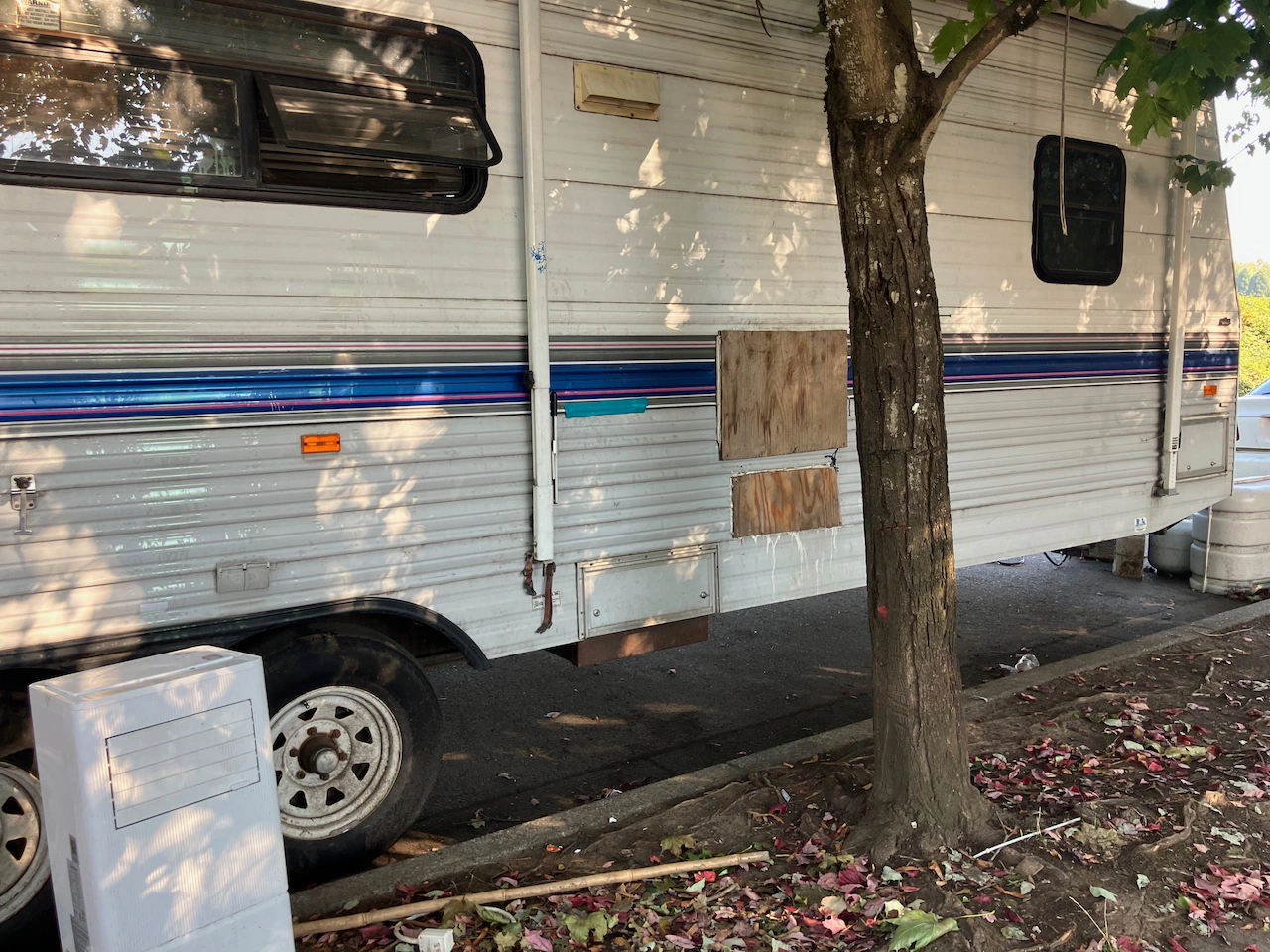
Portland has eliminated one of its two homeless villages for people living in RVs at the same time as Mayor Keith Wilson is cracking down on the practice of people sleeping in derelict vehicles.
The 55-spot Sunderland RV Safe Park, which opened more than two years ago near the intersection of Northeast Marine Drive and 33rd Drive, shut down Monday.
The closure of the Salvation Army-run site leaves Portland with just one safe RV parking location, about 10 minutes west of Sunderland. That site, called North Portland Road, has 70 parking spots and 90 sleeping pods. But to live there, people must agree to give up their RV when they move out.
Wilson’s long-term goal is to phase out RV shelter sites entirely and usher more vehicle-dwellers indoors as part of his broader pledge to end unsheltered homelessness in Portland, according to Cody Bowman, his spokesperson.
Since taking office in January, the mayor has routinely cast the hundreds of severely damaged or inoperable cars and RVs found along Portland’s streets, parks and other public rights of way as health and safety hazards to their occupants, other road users and the broader community.
“We are building more shelters and day-use centers so no one is forced into a rundown RV,” Bowman said. “Our goal is to move people into safe, supportive shelter as quickly as possible.”
Closing the RV sites marks a shift in the city’s homelessness policies, which since 2020 have focused on building out alternative 24-hour shelter sites, including village-style shelters and RV parking locations. In contrast, Wilson has pushed for an expansion of overnight-only congregate shelters to meet his goal of creating 1,500 new shelter beds by Dec. 1.
Some elected officials and shelter residents aren’t thrilled with his decision to abandon the RV sites.
Kevin Fine, 50, said he had been living at the city-funded Sunderland site for a little over a year hoping to get help signing up for disability payments. He moved in with his three most valuable possessions: his truck, trailer and a three-wheeled Polaris Slingshot that he estimates are together worth at least $40,000.
Fine said he was pressured to accept a sleeping pod spot at one of the city’s alternative shelters as part of the effort to wind down the RV shelter, but he didn’t want to abandon his property. The city does not provide parking or storage for large vehicles belonging to people staying in village-style pods and residents are asked to consolidate the belongings they bring with them down to about two full bags.
“They really coerce you to get people to go to pods,” he said in an interview last week.
Fine showed The Oregonian/OregonLive a flyer he said he was given about a month ago, urging Sunderland residents to make immediate plans to leave the site and warning “RV/Trailer living on street is illegal.”
“Take advantage of the resources the city is offering you, time is limited,” the flyer states in large font on one side. On the other, in bold and partially highlighted in bright yellow, it reads: “There is no benefit from holding out! You should act on your current options now!”
But Fine was so dissatisfied with the options he’d been given that he said he began to pull his trailer out of the Sunderland lot by hand last Wednesday. Eventually, he said the site manager relented and let a friend with a valid driver’s license pull his trailer out.
As of last Thursday afternoon, Fine was parked on the side of the road just off Northeast 33rd Drive, with no immediate plan for what to do next other than to try to avoid getting towed.
‘A critical piece of our shelter system’
Sunderland became Portland’s first shelter to allow unhoused people to sleep in their vehicles when it opened in July 2023. Equipped with basic amenities, case managers and 24/7 staffing provided by The Salvation Army, the site was meant to provide stability for people who had been living on the side of roads and rights-of-way.
Many also touted such safe park shelters as a way to get scores of derelict vehicles off the street, including those that lined a lengthy stretch of Northeast 33rd Drive for years.
“As the point person to build the area’s first safe park village and having witnessed the conditions both before opening and since operating this site, I am aware of the positive impact this village had on the area,” wrote Dan Ryan, one of three city councilors who now represent North and Northeast Portland, in an email. “We can’t go back to pre-opening conditions!”
Ryan previously served as a Portland commissioner and helped lead efforts to expand the number of city-run alternative shelters, including the Sunderland site.
In December, city officials quietly announced they would close the shelter site on March 31 and turn the lot back over to its owner, the Portland Bureau of Transportation. The Transportation Bureau had long used the site for maintenance but agreed to move its operations temporarily to a nearby Port of Portland property to make space for the shelter, which has cost the city about $2.5 million a year to run.
After outcry by Ryan and other members of the City Council last winter, officials overseeing Portland’s homeless shelter system provided additional funding to keep it open until Sept. 30.
According to city figures, 160 people have stayed at Sunderland since it first opened, including 84 considered chronically homeless. Out of the total number of residents, 26 people secured permanent housing, 13 left for temporary housing and 45 returned to homelessness, data shows.
Seven went to other shelters and another seven went to “institutional settings,” which can include mental and physical health facilities or jail. The city data does not provide any detail for the remaining 62 people who’ve stayed at Sunderland.
Together, Portland and Multnomah County offer nearly 3,500 shelter beds each night, most of which are routinely full. About 7,500 people are estimated to be living outside or in their vehicle, according to county data. Supporters of safe RV parks argue that they are a valid option for people who are homeless while the city and county continue to have fewer shelter bed options than people in need of them.
“I continue to believe that designated places for RVs to park safely and legally are a critical piece of our shelter system,” said Portland City Council President Elana Pirtle-Guiney, who also represents North and Northeast Portland.
‘An unacceptable risk to our community.’
But Wilson doesn’t see it that way. He and city officials have routinely highlighted how occupants of derelict RVs can be exposed to mold and asbestos as well as fire and carbon monoxide risks. Sewage, gas and oil from the vehicles are often illegally dumped onto city streets or in natural areas, creating environmental hazards, according to his office.
In addition, rundown cars and RVs that serve as places for people to sleep sometimes block crosswalks and bike lanes, cluster along commercial and residential streets and negatively impact parks and other green spaces.
They “pose an unacceptable risk to the community,” said Wilson during a City Council meeting last month. “We need to reestablish community standards on public safety and sanitation.”
According to Bowman, the city is working to “step up” tag warrant enforcement and will soon begin towing any vehicle with six or more unpaid parking citations or fees totaling more than $500. The city already recently stopped waiving fees for people trying to retrieve a “lived-in” vehicle that’s been towed.
Wilson prioritized that enforcement in his budget this year, putting nearly $1.5 million toward towing and demolishing more derelict RVs. Officials say the cash infusion will help the city nearly triple the number of RVs it removes, from a current average of 34 a month to 95 this year.
Meanwhile, an additional $1.9 million to keep Sunderland open for another year was nowhere to be found as city leaders stared down a nearly $100 million shortfall this year.
“It was placed in the City Council’s hands,” city spokesperson Rob Layne said. “If they wanted to fund Sunderland, they needed to find the money for it. The City Council declined to find the money for it.”
Councilor Sameer Kanal called those comments “misleading.”
“The mayor chose to close Sunderland, and council didn’t have a majority vote to pass several councilors’ amendments that would have generated enough money to keep it open,” said Kanal, who represents North and Northeast Portland alongside Ryan and Pirtle-Guiney. “I’m profoundly disappointed that this is the outcome.”
Tyson Jenson, 44, said he has lived out of a trailer for several months, ever since he left his brother’s place. Getting dressed in the doorway of his trailer on the other side of the fence from Sunderland last week , Jenson said he was “feeling the squeeze” of the city’s efforts to crack down on RVs.
“They kick you around,” he said, noting that his vehicle had just been tagged for towing and that he would have to move again to avoid that happening. “It’s a merry-go-round. It feels like a game to them.”
Jenson, who works at a bottle drop location, said he understood people not wanting old RVs parked in front of their houses and said he believes a lot of people living out of their vehicles are noisy or dirty.
Jenson said he was “trying to leave this life on the street.” But he also said he needed help to find a place he could afford to live and to overcome his gambling addiction. He felt his trailer could be that place for a while if the city would leave him alone, but he said what he was hearing about the mayor made that seem unlikely.
“It kind of sounds like he means business,” Jenson said.
While Sunderland closes to RVs, Ryan, the city councilor, has said that he’s pushed Wilson to find other ways to use the site as part of the city’s broader homelessness strategy.
“I have asked the mayor repeatedly to offer a plan for utilization of this land going forward,” Ryan said.
The request to use the site for homeless services, it appears, has fallen on deaf ears.
According to Dylan Rivera, a spokesperson for the Portland Bureau of Transportation, the agency will soon be taking over the Sunderland site again.
Rivera said it will be used as an outdoor storage facility for sand the bureau uses during winter storms as well as for large poles for street lights and traffic signals.
— Shane Dixon Kavanaugh covers Portland city government and politics, with a focus on accountability and watchdog reporting.
Reach him at 503-294-7632 or at skavanaugh@oregonian.com
Follow on X @shanedkavanaugh or on Bluesky @shanedkavanaugh



